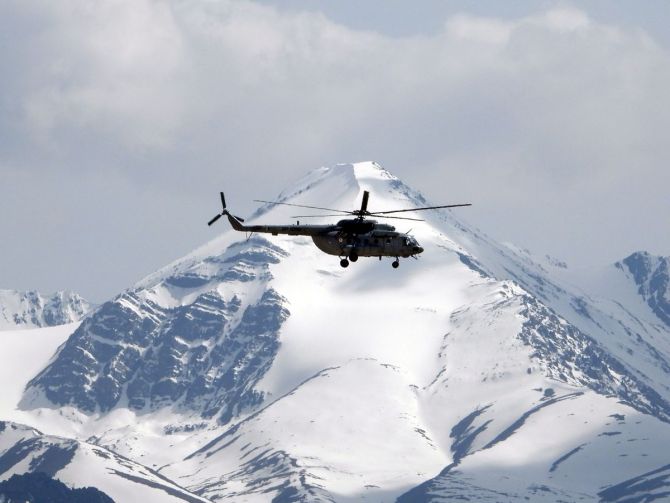'It is a game of patience. We have to stand firm and tire them out, which we are doing.'

"The advantage we have is that we already have positional defence and deployment on the LAC, which the Chinese have not had in the past," says Lieutenant General Vinod Bhatia (retd) PVSM, AVSM, SM, former director general, military operations.
General Bhatia was commissioned into the Parachute Regiment. He commanded a corps at the Line of Actual Control in Sikkim and an infantry division on the Line of Control.
"They have understood that we are neither going to go back or escalate the situation," General Bhatia tells Rediff.com's Archana Masih.
The concluding segment of a two-part interview.
- Part I: 'Galwan hurt the Chinese'
Do you think the military talks have achieved much? Have they been more productive than diplomacy?
Do you feel the military has been more aggressive in contesting Chinese claims, compared to the diplomatic effort?
It has been a mix of both military and diplomatic effort.
The military stood firm. The negotiations, flag meeting, border personnel meetings are reflective of the resolve when you are in contact with each other.
If you are weak at that point of time, your negotiations will be weak. Your strength gets translated into your negotiations.
The fact that there is no escalation is an indicator that we have achieved a sort of stalemate and equilibrium due to our military actions and military diplomacy.
Military talks have had a key role. We have experienced corps commanders who have been leading the talks.
It is the military talks that have resulted in the stalemate.
Militaries talk straight, even the PLA.
With the Chinese it is a game of patience because each talk is for many long hours.
What should we watch out for on the LAC in times to come?
In the immediate term the PLA has no reason to provoke the Indian Army. I say this because Galwan has been a lesson for them and we have good deployment on the border.
They have understood that we are neither going to go back or escalate the situation. We are not going to blink.
We don't want escalation and I don't think China has the intent to escalate either.
Our intent is to establish status quo ante. We have to tire them out by raising the cost for them. The frequent turnover of PLA troops is indicative of that.
40% PLA troops are conscripts. 20% of units turnover every year. Most conscripts serve in infantry and mortar units, they can't serve in the technical arms or can join the air force or navy which requires long years of training
Their risk aversion is minimal and they are looking over their shoulders to finish their tenures and go back.
Last year their turnover was to be done in in September, but it happened at the end of winter. It is to be seen how long can they sustain themselves.
It is a game of patience. We have to stand firm and tire them out, which we are doing.
When you look back at the year-long standoff, what do we need to improve upon?
1. We have to improve our Intelligence Surveillance Reconnaissance capability so that we can pre-empt them.
2. We need quick reaction forces which are more agile, lean to pre-empt any forward deployment of the PLA.
3. We need good infrastructure.
4. We need countervailing force.
We got a sanction for raising the Mountain Strike Force in July of 2013. It was to completed in 8 years at a cost of Rs 64,000 crores (Rs 640 billion). Had it been complete, it would have caused some decision dilemmas for the Chinese.
But our reaction has been very effective. The three services have given a joint and measured response. Our deployment has been equitable, proportional and in quick time.
Our troops have shown resilience and resolve. This has helped us achieve a sort of moral ascendancy at the contact points.
What lessons have we taught the PLA?
If they want to do this again, they will have to be much, much better prepared. They miscalculated our response. They did not realise that we'll be able to respond in such quick time in such a measured manner.
Secondly, they are using technology to overcome their weaknesses in manpower and combat power. Techologically, they are much better than us.
Do you think complete disengagement is possible?
Yes, but it is a game of patience. We have to outmanoeuvre, out-think and outsmart them in this game.
Disengagement is possible, but it will take time.
The advantage we have is that we already have positional defence and deployment on the LAC, which the Chinese have not had in the past.
Once the Chinese start deploying along LAC, they will realise the cost. I am not saying that the Chinese are not a good army; they are, but it will take time for them to get acclimatised and adapt to being deployed on the post.
They are deployed in the Tibet Military Division, but they stay in barracks and move in vehicles to the LAC. They are not as sturdy as our men.
Feature Presentation: Aslam Hunani/Rediff.com











 © 2025
© 2025